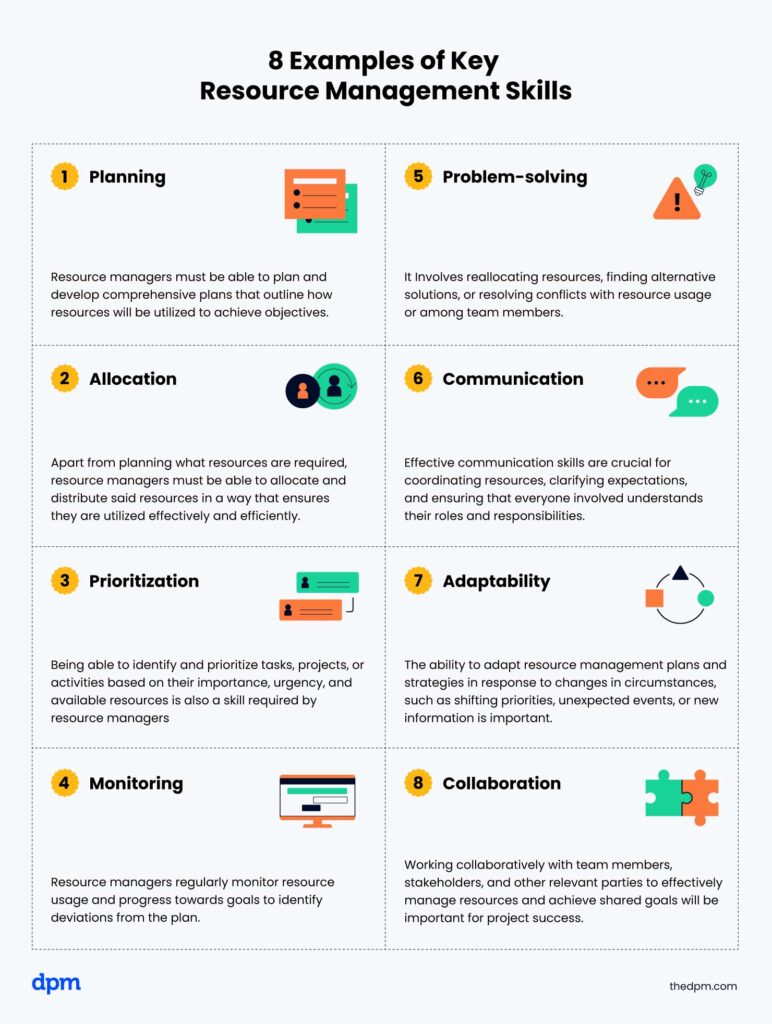Projects rarely have unlimited resources. To help you better manage the resources you do have on a project, let’s take a look at some resource management skills you should master and how to go about doing so.
What Are Resource Management Skills?
Resource management skills refer to the ability to effectively allocate, utilize, and optimize various resources to achieve specific goals and objectives for a project.
Project resources can include human resources (members of the project team), financial resources (budgets, funds), time, materials, equipment, and information. Good resource management skills are essential and crucial for maximizing productivity, efficiency, and the success of a project or program.
What Do Resource Managers Do?
Resource managers play a critical role in organizations and project teams by overseeing the allocation, utilization, and optimization of various resources to support the achievement of specific goals and objectives. Depending on the organization, these people might have the title and role of a project, program, or portfolio manager.
Their responsibilities may vary depending on the specific context of the organization, but typically include the following:
- Working closely with project stakeholders to develop plans that outline the resource requirements for achieving project objectives.
- Allocating resources appropriately to different projects, teams, or departments.
- Monitoring resource usage and ensuring resources are being utilized effectively and efficiently.
- Identifying opportunities to optimize resource usage and improve efficiency by streamlining workflows, eliminating waste, or implementing new technologies or practices.
- Assessing potential risks that may affect project execution and creating strategies to mitigate these risks, such as contingency plans and measures to minimize the impact of disruptions.
- Dealing with conflicts or disputes related to resource allocation or usage. They may need to negotiate with stakeholders, mediate disagreements between team members or other project teams, or find creative solutions to resource-related issues.
8 Examples of Key Resource Management Skills

Project management skills go hand in hand with resource management skills, so it’s worth thinking about how you can hone them in tandem. Helpful skills for resource managers include the following.
1. Planning
Resource managers must be able to plan and develop comprehensive plans that outline how resources will be utilized to achieve objectives. This involves being able to set clear goals, identify and analyze project and resource requirements and establish timelines.
They must have strong capabilities for estimating resource needs, developing timelines and budgets for acquiring resources, and forecasting when the right resources will be required at the right time to avoid team member burnout.
2. Allocation
Apart from planning what resources are required, resource managers must be able to allocate and distribute said resources in a way that ensures they are utilized effectively and efficiently.
This may involve assigning tasks to individuals or teams, distributing budget funds, or scheduling equipment usage. Proper allocation ensures that the correct resources with the required skill sets are assigned to tasks that suit those skill sets. Allocation also involves ensuring that resource availability is factored into the work to ensure accurate capacity planning.
3. Prioritization
Being able to identify and prioritize tasks, projects, or activities based on their importance, urgency, and available resources is also a skill required by resource managers. This can help in focusing efforts on high-priority items and maximizing productivity.
4. Monitoring
Resource managers regularly monitor resource usage and progress toward goals to identify deviations from the plan. This allows for timely adjustments to be made to resource allocation, resource leveling, or other strategies. Resource managers must be able to proactively monitor and anticipate any bottlenecks to ensure that resource utilization is optimal.
They also use various tools to gather data and assess performance against predefined metrics. Resource management software such as Saviom and Mach-ai provide tools such as dashboards that ease the process of tracking resource capacity and utilization. Excel spreadsheets and templates are often used at the PMO level, and provide a data-driven approach for monitoring resource usage.
5. Problem-solving
One of the essential skills for a resource manager is problem-solving. Being able to quickly address resource-related issues or challenges that arise during project execution is vital.
This may involve reallocating resources, finding alternative solutions, or resolving conflicts with resource usage or among team members. Resource conflicts can often be a distraction for project team members so it is important that a resource manager have good problem-solving skills.
6. Communication
Resource managers with excellent communication skills are essential for projects. Effective communication skills are crucial for coordinating resources, clarifying expectations, and ensuring that everyone involved understands their roles and responsibilities.
7. Adaptability
The priorities and objectives in the project plan might change throughout the project. Being able to respond to change and adapt is an important skill for resource managers. The ability to adapt resource management plans and strategies in response to changes in circumstances, such as shifting priorities, unexpected events, or new information is important.
8. Collaboration
As resource managers will be required to work with a variety of stakeholders, collaboration skills are key. Working collaboratively with team members, stakeholders, and other relevant parties to effectively manage resources and achieve shared goals will be important for project success.
How To Improve Your Resource Management Skills
You may already have some of the skills to be a successful resource manager, but there’s always room for improvement. Improving your resource management skills requires a combination of self-awareness, learning, practice, and implementation of effective strategies.
Here are some steps you can take to enhance your resource management skills:
- Self-assessment: Reflect on past experiences working on projects and consider where you have succeeded or encountered challenges in managing resources effectively. Asking others for feedback on your performance is also an input for your self-assessment. Examine any gaps in your soft skills such as communication or collaboration and develop a plan to address those gaps.
- Set clear goals: Establish specific, measurable goals for improving your resource management skills (i.e. SMART goals). Determine what you want to achieve and define clear objectives that will help you track your progress.
- Educate yourself: Take advantage of resources such as books, online courses, workshops, and seminars to learn about resource management techniques, principles, and best practices. Familiarize yourself with relevant tools and methodologies used in resource management. This will not only be useful for a current project you are working on, but also for any upcoming projects or future projects.
- Continuously improve: Resource management is an ongoing process, so make a commitment to continuously improve your skills. Stay informed about emerging trends, best practices, and new technologies in resource management, and be open to adapting your approach to incorporate new insights and innovations.
How To Become A Resource Manager
Becoming a resource manager typically involves a combination of training, hands-on experience, and developing key skills. Here's a general roadmap to becoming a resource manager.
1. Get trained and certified
Training in project planning, budget planning, risk management, and human resource management provides a good foundation for becoming a resource manager.
Places like The Digital Project Manager, LinkedIn and Coursera offer a variety of courses and training to help you get prepared to become a resource manager. Having a project management certification may also provide you with a solid foundation such as the Project Management Professional (PMP) or Certified Resource Management Professional (CRMP).
2. Gain Hands-on Experience
Building relevant experience is crucial for becoming a resource manager. Look for opportunities to work in roles that involve project management, operations management, team leadership, or resource coordination. This could involve starting in entry-level positions and gradually taking on more responsibilities related to resource management. Or it could mean volunteering for these roles if opportunities come up within your organization.
3. Seek Opportunities for Mentorship
Look for opportunities to learn from others who may be in leadership roles or lead projects that involve resource management responsibilities. Volunteer to shadow those in leadership positions within your organization.
Try and establish a regular cadence of mentorship sessions with your mentor and be prepared to ask for specific guidance and feedback on career development.
4. Build a Network
Networking can be invaluable for advancing your career in resource management and for becoming a resource manager.
Connect with professionals in the field, join relevant industry groups or associations, attend conferences and events, and participate in online forums or discussion groups to expand your network and learn from others in the field. Look for both virtual and in-person networking events inside and outside of your community.
5. Stay Updated and Develop your Skills
Stay informed about industry trends, emerging technologies, and new developments in resource management practices. Continuously seek opportunities for professional development and lifelong learning to stay current and enhance your skills.
Focus on developing key skills that are essential for resource management, such as communication, problem-solving, strategic planning, time management, conflict resolution, and leadership. Seek out training and volunteer opportunities, workshops, and online courses to enhance these skills.
No Mystery Here
By taking proactive steps to enhance your resource management skills, you can become more effective at allocating, utilizing, and optimizing resources.
Start with our Mastering Digital Project Management course, now available through The Digital Project Manager's membership. It covers not only resource management, but the entire project life cycle from start to finish and a variety of different project strategies that can contribute to project success.


